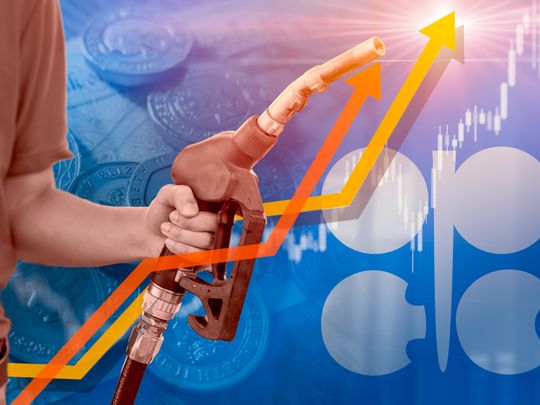
Dubai: With the world’s major oil-producing countries announcing on Sunday how they plan to keep their output of crude oil low until June, you would have wondered how such decisions would impact your fuel costs. Let’s see how such collaborative global decisions affect fuel costs and your wallet.
The group of countries, referred to as ‘Organisation of the Petroleum Exporting Countries’ or ‘Opec’, announced they will extend oil production cuts until the end of second quarter of this year. The price of ‘Brent’ crude, the international oil standard, jumped up 2.5 per cent in the run up to the news.
“When oil production is collectively cut globally, motorists can expect prices at fuel pumps to be indirectly impacted, but the change is far from significant,” explained Ahmed Ghazi, a commodities analyst and industry researcher based in Abu Dhabi.
“The price of oil products like diesel, petrol, gasoline, or kerosene are not directly proportional with the price of crude oil as the difference in value between the products produced by an oil refinery and the value of the crude oil used to produce them differ, based on global demand for oil.”
But what does this mean for world fuel prices?
This is because not every country has crude oil, Ghazi added. “As it’s vital for every economy, many import crude oil. Given refineries that process crude oil are located in a different country than where the crude oil is produced, countries also have to import oil for refineries at an additional cost.”
So the price of fuel covers the cost of acquiring and refining crude oil as well as distributing and marketing it. But oil prices, and in turn the everyday cost of fuel, are fundamentally determined by the market forces of supply and demand. Here, we take a detailed look at these detrimental factors.
Impact of oil production cuts on global oil prices
Global oil supply has to do with how much oil is available in the world, which has historically been decided by countries that form part of Opec, an intergovernmental organisation of 13 countries, which collectively controls 40 per cent of the world's supply of oil.
Demand, on the other hand, is determined by how much need there is for oil at a given time. That need is for things like heat, electricity and transportation, driven by everything from fuel for cars and airline travel to electrical generation. These two factors in turn affect fuel prices worldwide.
“Reducing oil production means less supply on the market, which obviously pushes prices higher. Because the current cuts are planned to last until the middle of the year, the effect – albeit indirect – on oil prices is also expected to be prolonged,” added Ghazi.
Edward Bell, Head of Market Economics at Dubai-based bank Emirates NBD, said it was widely expected that oil production cuts will continue, as “returning a significant volume of oil barrels back to the market for the second quarter of 2024 would likely have overwhelmed demand even more”.

An extension of the OPEC+ cuts was our baseline scenario for oil market balances this year as returning a significant volume of barrels back to the market for Q2 would likely have overwhelmed demand even more and led to substantial inventory builds
How does the cost of oil determine the cost of fuel?
“Although indirectly, the cost of crude oil is among the key factors in the price at which fuel is sold worldwide. Because of this, changes in the retail price of petrol or diesel typically track changes in the global crude oil price,” explained Ghazi.
Some of the crude oil that the country imports is refined by refineries into petroleum products – such as petrol, heating oil, diesel fuel, and jet fuel. Also, some of imported petroleum may be stored and subsequently exported.
“The cost of crude accounts for about half of the overall price of fuel, according to regulatory data from most key economies worldwide, apart from refining, distribution and marketing costs, which are generally reflected in the wholesale costs that fuel retailers pay to distributors,” noted Ghazi.
How are people affected when the price of oil rises?
While studies show that crude oil and petrol prices are highly “correlated”, or linked, economists widely estimate that every $10 (Dh36.7) rise in the cost of a barrel of oil triggers a 0.4 per cent rise in global inflation — the general increase in prices (and fall in the purchasing value of money).
However, prices may not rise as much as analysts cautioned that Opec's announcement could turn out less impactful than feared. The reason being that just last year Opec+ announced a similar-sized production cut, but the actual cut turned out to be just half that.
"Will the size of the cut really be a million [barrels per day] plus or will it be something less? That's entirely possible, added Ghazi. “They have a month to figure out what they really want to do."
Key takeaways
Like most commodities, the fundamental driver of the global price of oil (and also the cost of fuel) is supply and demand. While oil supply is somewhat controlled by a 13-member group of oil-producing nations called Opec, oil demand is driven by fuel for transportation to generating electricity.
Theoretically, if the oil supply increases, prices respond by going down and rising, if supply decreases. Likewise, if demand decreases, prices should decrease and rise if demand increases. However, with production levels now being kept in check, oil prices are expected to largely edge lower worldwide, at least for now.
“As long as demand [for fuel] change but supply doesn't, then it theoretically means a dip in prices over time – but in actuality, the expliantion isn't that simple,” added Ghazi. “Pricing in the effects of currently expensive crude oil could drive fuel price higher, but that also depends on how much lesser people drive.”
So, it’s not just supply and demand that drives the price of oil. When it comes to how the price translates to the everyday cost of fuel, it also depends on how the cost of extracting and producing oil factors into the price, in your respective country.








_resources1_16a4a1613d8_small.jpg)


